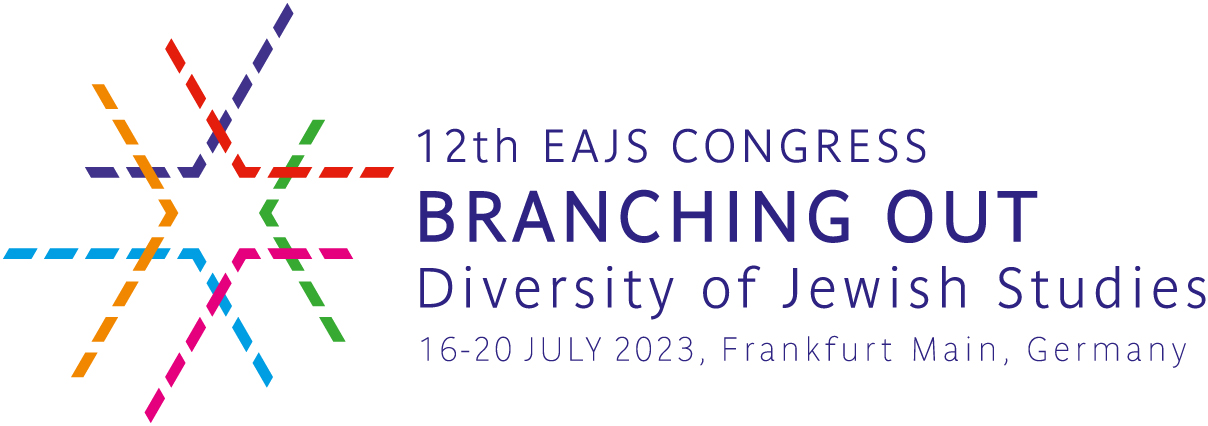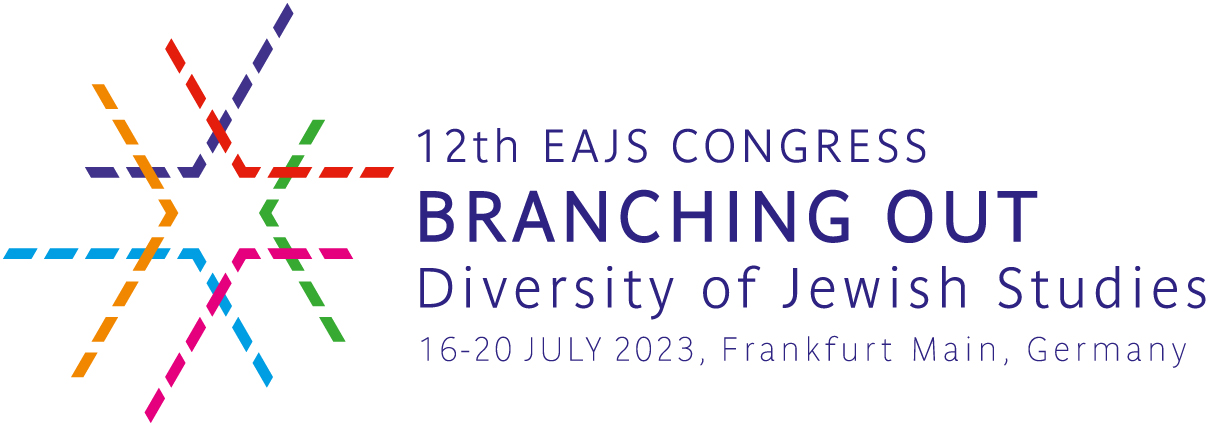- GU Home
- 12th EAJS Congress
- Call for Papers
Call for Papers
Decisions were sent out by 16 February 2023. If you have not received a mail, check your spam and/or contact us at congress@eajs-2023.eu.

Scholars of
Jewish Studies from Europe and beyond are invited to propose papers and
sessions. The maximum duration of a paper is twenty minutes with additional ten
minutes reserved for discussion. The language of the congress and all papers is English.
Each person may submit one paper and organize or chair multiple sessions.
Please download the relevant form (see the right column) and fill in all fields. In order to choose your section, please refer to the list and description of the sections below. Then send the pdf file to submit.paper@eajs-2023.eu, under the header “Proposal."
PhD students who wish to present their work within the framework of the regular call for papers need to add a letter of recommendation from their supervisor to their proposal. The letter has to be included in the same mail, together with the proposal.
Sessions may include either four speakers or three speakers and a respondent. If you wish to propose another format (round table, etc.), please use the sessions form, fill in the rationale for the session and add a description of the planned format in the session.
We expect sessions to honor the title of the congress and reflect the diversity of Jewish Studies scholars by considering the possibilities of gender diversity, and by including scholars from different universities and at least one early career researcher. Sessions that do not reflect diversity will be at a significant disadvantage in the review process.
Proposals for papers and sessions will be accepted until December 31st 2022, 23:59h (GMT +1). All proposals received until this date will be reviewed by specialists in the respective field of Jewish Studies. Decisions will be communicated in February 2023. Papers and sessions will be included in the program only if (all) speakers have registered for the congress and paid their fees by March 31st 2023.
Sections
|
The Bible and its Reception |
The section will contain panels on all aspects of the Bible and its
reception in Judaism, including but not limited to the study of the biblical
text, the transmission of the Bible, Jewish exegesis throughout the ages,
etc. |
|
Second Temple Judaism |
The boundaries of this section are temporal, the topics, such as
Temple, priesthood, diaspora, Samaritans, apocryphal and pseudepigraphical
literature, are diverse. |
|
Rabbinic Literature and its Reception |
This section understands “rabbinic literature" in the widest possible
sense and can include panels on Mishna, Tosefta, the Talmudim, early and late
midrash, geonic literature, and the reception of this literature throughout
the ages, etc. |
|
Medieval Hebrew Literature |
This section deals with both secular and religious literature, both
prose and poetry, mainly in Hebrew. |
|
Modern Jewish Literature |
This section is open to discuss modern Jewish literature in all
languages, focusing on the contribution of literature to Jewish culture and
how Judaism is communicated to a Jewish and non-Jewish audience. |
|
Hebrew Studies |
In addition to papers on questions of Hebrew linguistics, this section
welcomes papers on the history of Hebrew linguistics and on teaching Hebrew
in the diaspora. |
|
Jewish Languages |
This section welcomes papers on all languages and dialects used
exclusively or mainly by Jews, such as Yiddish, Judeo-Spanish, Judeo-Arabic,
Jewish Aramaic dialects, Judeo-Italian, etc. |
|
Ancient Jewish History and Archaeology |
Papers dealing with Jewish History from before the Second Temple
period, as well as papers with a focus on an entanglement of Jewish
History/Archaeology are addressed here. |
|
Medieval Jewish History |
In this section all papers on Medieval Jewish History in the broad
sense, be it Sephardic, Ashkenazic, Byzantine or Mizraḥi, find their place
here. |
|
Early Modern Jewish History |
The
early modern period – roughly the three centuries between the expulsion of
the Jews from Spain in 1492 and the Haskalah – was a period of intense
cultural encounter, both between Jews from various cultural backgrounds and
with Christians and Muslims. Papers in this section will address the wide
array of historical, cultural, religious, economic, and social factors
shaping the early modern Jewish experience and its cross-cultural
connections. |
|
Modern Jewish History |
For this congress, we consider the Haskalah and the beginning
of the “Nation State" in Europe to define the beginning of Modern Jewish
History, which reaches to the present day and includes the age of
globalization and also covers topics such as Zionism, migrations and the
like. |
|
Shoah and Antisemitism |
Papers in this section deal with the Shoah and its impact on Jewish
life. Additionally, other manifestations of Antisemitism will be discussed. |
|
Regional and National Jewish History |
This section is the natural choice for organized panels that focus on
a specific region, and is also open to individual proposals that deal with a
specific Jewish community. |
|
Jewish Frankfurt |
Honoring the city in which the congress will take place, we invite
proposals for papers that focus on any and all aspects of Jewish life and
history connected to Frankfurt, including research into Jewish Frankfurt but
also topics inspired by Frankfurt Jews and their experiences, such as “Jewish
participation in democratic rule" (inspired by the Jewish members of the
Paulskirche parliament), “Strengthening Jewish identity through teaching
Jewish topics" (inspired by the Frankfurt Lehrhaus), or “Jewish philanthropy"
(inspired by the Rothschild family). |
|
Jewish Law |
Halakhah in all its diverse literary forms and developments, from halakhic
topics in classical rabbinic literature to Halakhah in our days,
encompassing many cultural adaptations in time and place. |
|
Jewish Thought |
With a very wide conception of “Jewish Thought" that also includes
questions like Musar (as dissemination of Ethics), we invite papers on all
aspects of Jewish Thought from Antiquity to contemporary Jewish Thought. |
|
Jewish Liturgy and Ritual |
This section includes all aspects of the study of Jewish prayer and
liturgy. |
|
Jewish Mysticism and Magic |
This section deals with Jewish Mysticism from all ages, from Hekhalot
literature, through Haside Ashkenaz up to Kabbalah and the mystical
components of Hasidism. Additionally, the topic of Magic, within and without
Jewish Mysticism, is addressed. |
|
Non-normative Judaisms |
True to the subtitle “Diversity of Jewish Studies" this section
invites proposals on all non-normative groups and movements that developed
from Judaism, including but not limited to Samaritans, Qumran, early
Christianity, Karaites, Sabbateans, Frankists, etc. |
|
Jewish Folklore |
This section includes Folklore, Ethnology, Anthropology throughout
Jewish History of all times and places. |
|
Manuscript Studies, History of the Jewish Book |
This section covers codicology, paleography, the study of individual
manuscripts, production and distribution of manuscripts and books, and any
paper that is interested in the materiality of the written word. |
|
Libraries, Archives, Information Management |
Collections, their history, their management and all kinds of
questions regarding information management that concern the world of Jewish
Studies. |
|
Jewish Museology |
Jewish Museums and the exhibition of Jewish objects/Jewish topics in
other museums, preservation of material Jewish culture, concepts of
presenting Jewish culture and/or history to audiences (in Europe). |
|
Jewish Art |
The section brings together Jewish Art from all periods, with a focus
on the visual arts and architecture. Sessions on medieval art will not take
place at the same time as sessions in Manuscript Studies. |
|
Jewish Performing Arts: Music, Theater, Film |
The focus of this section is on papers concerning Jewish Performing
Arts in various forms, without any boundaries of time and space. |
|
Diversity/Gender Studies |
All papers addressing Diversity/Gender studies in the widest sense are
included in this section. Topics ranging from “Women in the Talmud" to “the
feminine in Kabbalah", as well as discussions of diversity within Jewish sources, etc. |
|
Digital Jewish Studies |
In addition to the workshop organized by the EAJS Digital Forum, we
invite scholars to share their projects and experience in Digital Jewish
Studies. |
|
Other |
We encourage you to place your paper or session into one of the
provided sections. Only if you are convinced that your paper/session fits
into none of the categories but is an essential contribution to Jewish
Studies choose “other" in the drop-down menu and provide a suggestion how you
would define the section in the abstract. |
- Aktuelles und Presse
- Pressemitteilungen
- Öffentliche Veranstaltungen
- Uni-Publikationen
- Aktuelles Jahrbuch
- UniReport
- Forschung Frankfurt
- Aktuelle Stellenangebote
- Frankfurter Kinder-Uni
- Internationales
- Outgoings
- Erasmus / LLP
- Goethe Welcome Centre (GWC)
- Refugees / Geflüchtete
- Erasmus +
- Sprachenzentrum oder Fremdsprachen
- Goethe Research Academy for Early Career Researchers
- Forschung
- Research Support
- Forschungsprojekte, Kooperationen, Infrastruktur
- Profilbereich Molecular & Translational Medicine
- Profilbereich Structure & Dynamics of Life
- Profilbereich Space, Time & Matter
- Profilbereich Sustainability & Biodiversity
- Profilbereich Orders & Transformations
- Profilbereich Universality & Diversity







